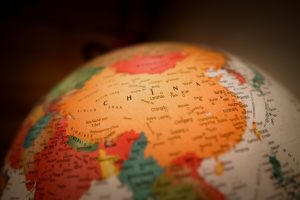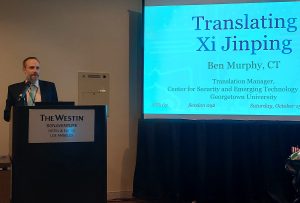
By: Ben Murphy, CT Edited by: Fang Sheng
As a translation project manager and editor, one of my jobs is to set guidelines for how certain “tricky” words and phrases should be translated. There are a great many such “tricky” or even “treacherous” terms that I encounter when working in my usual language pair, Chinese to English.
When translating—or editing someone else’s translation—I’m often reminded of that scene in the movie Apollo 13 when the engineers at NASA assemble all of the same gear the astronauts have available to them, dump it out on a table, and say “we gotta find a way to make this” (a cube-shaped carbon dioxide filter) “fit into the hole for this” (a cylindrical carbon dioxide filter). Chinese-to-English translation is often a lot like that. Fitting a square peg (the Chinese language) into a round hole (the English language).
One example of this dilemma that I faced involves the Chinese word 强国 qiángguó. The first character 强 qiáng means “strong.” The second character 国 guó means “country,” “nation,” “kingdom,” etc. Translated literally, qiángguó is thus “strong nation.” But “strong nation” is a bit clunky in English, and as we’ll see, there is some nuance to this term that a literal translation obscures.
In December 2020, I published an English translation of the Proposal issued by the 19th Central Committee of the Chinese Communist Party (CCP) at its Fifth Plenum in October that year. The Fifth Plenum Proposal laid down guidelines for China’s 14th Five-Year Plan, the Outline of which the Chinese government subsequently released in March 2021.
The word qiángguó appears 15 times in the Fifth Plenum Proposal. Broadly speaking, the Proposal uses qiángguó in two different senses. First, it can be used to describe a country’s—China’s, in this case—overall geopolitical status. The first mention of qiángguó in the Proposal is in the context of China’s “Two Centennial Objectives” (两个一百年奋斗目标). The second of the Two Centennial Objectives is to “establish China as a rich, strong, democratic, civilized, harmonious, beautiful modernized socialist qiángguó” by the centennial (2049) of the founding of the People’s Republic of China (PRC).
The other 14 mentions of the word qiángguó in the CCP Fifth Plenum Proposal use the term in a slightly different sense, to refer to China becoming or remaining a world leader in a specific domain: a cultural qiángguó, educational qiángguó, talent qiángguó, sports qiángguó, science and technology (S&T) qiángguó, manufacturing qiángguó, cyber qiángguó, trade qiángguó, maritime qiángguó, and so on.
When I initially published my translation of the Fifth Plenum Proposal, I translated qiángguó as “superpower.” After all, 14 of the 15 mentions of the word in the Proposal were in the more specific sense, which I think corresponds fairly nicely to the way English speakers use the word “superpower” loosely, as in “Jamaica is a track and field superpower.” Here I followed the lead of my fellow Chinese S&T policy translators at Stanford University’s DigiChina project, who advocate for the “superpower” translation in the context of the term 网络强国 wǎngluò qiángguó, which they translate as “cyber superpower.”
However, after I published the translation, I received some pushback. Not from my fellow Chinese S&T translators, but from China foreign policy and geostrategy scholars, including one of my professors from graduate school! These critics argued that the English translation “superpower” should be reserved exclusively for the Chinese term 超级大国 chāojí dàguó—literally, “ultra-great power”—not for qiángguó.
Chāojí dàguó does unambiguously mean “superpower,” but it is used in a limited, pejorative sense only. Specifically, Chinese writers began using chāojí dàguó during the Cold War to refer to the two superpowers of that era, the United States and the Soviet Union, and continue to refer to the United States as the world’s sole chāojí dàguó today. For decades, CCP theorists have criticized “superpowers” for abusing their power and seeking “hegemony” (霸权). They never refer to China as a chāojí dàguó, because that would imply that China is striving for world domination in a similarly odious manner.
My critics made a very good point. If, one day, Chinese leaders begin describing China as seeking chāojí dàguó status, that would mark a very big shift in Chinese foreign policy. But people who can’t read Chinese and rely on English translations to understand Chinese policies might overlook this huge change in rhetoric if they are used to seeing the word “superpower” in translations of Chinese official pronouncements.
Clearly, then, the square peg of qiángguó doesn’t fit neatly into the round hole of “superpower.” What is a translator to do?
My solution, which I continue to use today, is to translate qiángguó in one of two different ways, depending on context. Where the term is used in the overall, geopolitical sense, I translate it as “world power.” This way, I reserve the translation “superpower” for chāojí dàguó. Additionally, I think “world power” sounds stronger than “great power,” the translation I use for the Chinese word 大国 dàguó when it is used in this same broad sense. As my friends at DigiChina have noted, a qiángguó is essentially an upgraded version of a dàguó.
However, when the Chinese text refers to a specific flavor of qiángguó, such as an S&T qiángguó, I translate it as “powerhouse.” I think “S&T powerhouse” conveys the same meaning in English as “S&T superpower,” but without the baggage of the latter term. And this translation holds up even in instances where my Chinese source document makes a distinction between dàguó and qiángguó status—the latter being stronger—in a particular domain. For example, I render 制造大国 zhìzào dàguó as “a manufacturing power”—I translate dàguó as “power” when the source text refers to a specific type of dàguó—and 制造强国 zhìzào qiángguó as “a manufacturing powerhouse.” Conversely, on the rare occasions when I edit an English-to-Chinese translation, such as a recent speech by U.S. Treasury Secretary Gina Raimondo, I translate “superpower”—when used in the loose, informal sense—as qiángguó in Chinese.
I will concede that, by translating the same Chinese word in two different ways, I am violating one of my general principles of translation, which is to translate each Chinese term the same way, consistently, in English. But, in my defense, there are many other Chinese words that can and should be translated in multiple ways in English, depending on how they are used. 安全 ānquán can mean either “safety” or “security.” 卫生 wèishēng can mean either “health” generally or, more specifically, “sanitary,” “sanitation,” “hygiene,” and so forth. In other words, not every square peg will fit into the same round hole every time.

Ben Murphy is Translation Manager for the Center for Security and Emerging Technology (CSET), a think tank based at Georgetown University in Washington, D.C. He is an ATA-certified Chinese-to-English translator.
Great insights from a real master. This piece is every bit as good as Ben’s ATA63 presentation. Thank you, Ben!